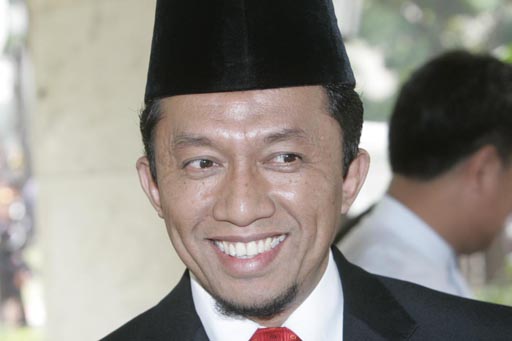
The government will crack down — again — on pornographic websites to support the nation’s Muslims when Ramadhan starts on Friday, a minister has said.
“As this is the Ramadhan fasting month, we need to strengthen our efforts,” Communications and
Information Technology Minister Tifatul Sembiring told reporters at a press conference at the ministry on Wednesday.
Tifatul, known for his antics such as claiming he was “forced” to shake the hand of US First Lady Michelle Obama during a visit to Jakarta, said that the crackdown would focus on local Internet service providers (ISP).
The minister, a politician from the Islamic-based Prosperous Justice Party (PKS), said that officials would remain vigilant in their work to limit access to pornography in Indonesia, fasting month or not.
“During our tests, we found a small number of sites that had previously not been detected. In general, we have shut down most of them. We will also be on high alert beyond the end of the Ramadhan fasting month,” Tifatul said.
The Communications and Information Ministry previously reported that more than 2 million porn sites could be accessed inside Indonesia and that 1 million sites, most of which were run by overseas providers, had been blocked on orders from the ministry as of early this month.
Twelve major local ISPs each reported 2.5 million attempts to access sites with pornographic content every month, according to the ministry, which claimed it had also received “100 million” public complaints on Internet pornography.
The number of complaints received by the ministry was up from the 835 complaints it reported receiving in 2011.
According to a report released by Google in February, Indonesia had the third-largest number of Internet users looking for pornography online, behind China and Turkey.
The ministry said that pornography topped its list of “negative” online content, along with illegally shared songs of Indonesian artists, gambling, bogus investment schemes and drug sales.
Tifatul’s statements follow President Susilo Bambang Yudhoyono’s creation of the Anti-Pornography Task Force in May, which was required to implement the 2008 Pornography Law.
Last week, the government set up a joint ministerial team to step up efforts to stop online gambling.
The director general for informatics applications at the ministry, Ashwin Sasongko, said that the public had an important role to play in the anti-pornography campaign, given the ministry’s limited resources.
“We urge people to restrain themselves from trying to access any of those porn sites, because no matter what, they will always be available,” Ashwin said.
Ashwin said that the crackdown was launched for the benefit of Muslims, who were expected to refrain from sexual intercourse during daylight hours during Ramadhan, among other things.
“We are responsible for protecting the younger generation from consuming destructive pornographic content on the internet,” Ashwin said.
“This is really important especially ahead of Ramadhan. We hope that Muslims can fast peacefully,” Ashwin added.
The story so far
Oct. 2008
House endorses Pornography Law.
July 2010
Communications and Information Technology Ministry starts blocking porn websites and orders local ISPs to assist nine days later.
Jan. 2011
Minister Tifatul Sembiring sets deadline for Research in Motion (RIM) to ban local users from accessing pornography using the Canadian firm’s BlackBerry smartphones.
Feb. 2012
Ministry says it has blocked nearly 1 million pornographic websites.
March 2012
President sets up Anti-Pornography Task Force.




Post a Comment